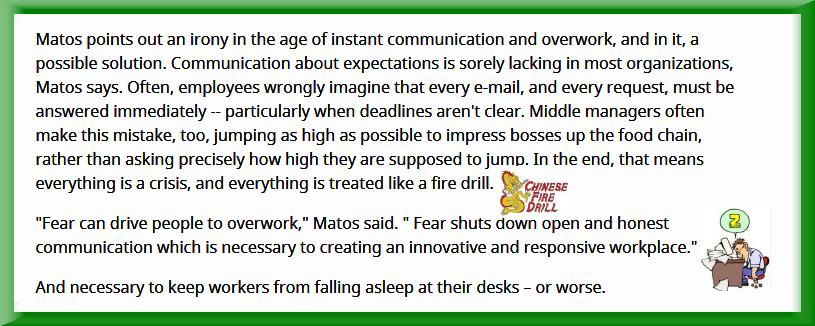Are you 'binge working'? The question is deadly serious
Bob Sullivan, NBC News contributor
Jan. 23, 2014 at 1:26 AM ET
Jan. 23, 2014 at 1:26 AM ET

We're working long hours, sleeping less and pumping ourselves up with caffeine. It's a recipe for disaster.MORE HERE:
Jeff Hutchens / Getty Images file
We're working long hours, sleeping less and pumping ourselves up with caffeine. It's a recipe for disaster.
More people are living a life marked by energy-drink-fueled all-nighters.
A toxic combination of digital leashes, the hypnotic effects of technology, economic anxiety, and caffeine is encouraging workers to push far beyond normal limits in the name of hard work.
It’s a costly trend. Consequences range from poor work and long unscheduled absences, to workers paying with their health, and in rare cases, their lives.
Take Mita Diran. The 24-year-old advertising copywriter worked for 30 hours straight just before Christmas, bragged that she was "still going strooong" on Twitter, and dropped dead within hours. The young Indonesian was the latest high-profile victim of what some are now calling "binge working."
Diran's story is eerily similar to that of Li Yuan, an ad writer at Ogilvy & Mather in China, whose heart stopped in May after similar bouts of overwork.
It's also similar to the sorry tale of Moritz Erhardt. He died after a three-day work binge at Bank of America’s Merrill Lynch office in London. Erhartdt was a 21-year-old intern, and apparently desperate to prove himself worthy of a full-time job in banking. The death has prompted the bank to take steps to ease the frantic working conditions for ambitious junior staffers.
To this sad list you might even add a Taiwanese gamer known only as Diablo, who died in 2012 after a 40-hour video game binge.
Ken Matos researches workplace trends at the Familes and Work Institute, a non-profit. He points out that a few binge working deaths certainly don't make a trend, but he cautions that they are "a canary in a coal mine." More widespread consequences, he said, will be reduced life spans and other health impacts for workers who no longer take breaks, even on nights and weekends.
"While dropping over dead at one’s desk is likely to be a rare event, experiencing negative health consequences and reduced lifespans, as a result of decades intense work lives with little opportunity for regular recovery, is a more likely possibility," Matos said.
Virtual overwork is just the most obvious representation of a larger trend. Americans, for example, now toil for eight-and-a-half hours a week more than they did in 1979. This phenomenon has sometimes been called “the Great Speed- Up,” as workers simply can’t seem to jump off the digital rat-wheel.
The effect has shown up in government data, which indicates that 35 percent of Americans worked on weekends in 2011. We’re working at night, too, ruining the potential for those eight hours of rest. A survey in 2012 by the Centers for Disease Control and Prevention estimated that almost a third of working adults get six hours or less of sleep a night.
Technology has a lot to do with it. Not very long ago, when a worker left the office at 5 p.m., there was simply no way to get work out of them until they arrived the next day at 9 a.m. No one would expect a response to an inquiry made at 4:30 on a Friday afternoon.
But technology's influence on the collapsing boundaries between work and life is subtle, too.
Matos points out that email has created a vicious cycle in most workplaces, with workers expecting instant responses from each other at all times -- no one wants to be the team member who blocked a discussion for an afternoon by not replying. What was designed as an asynchronous, one-way-at-a-time communication tool -- akin to old fashioned postal mail -- is now synchronous, instant communication, like a phone call. It's as if we were all trying to carry on hundreds of phone calls at once. It's enough to drive anyone crazy.
Or to make us sick.
A recent survey of medical research published in the American Journal of Epidemiology lays out the case against overwork:
•Long working hours have been found to be associated with cardiovascular and immunologic reactions, reduced sleep duration, unhealthy lifestyle, and adverse health outcomes, such as cardiovascular disease, diabetes, subjective health complaints, fatigue, and depression.
•There is increasing evidence to suggest the importance of midlife risk factors for later dementia. Furthermore, the link between cognitive impairment and later life dementia is clearly established.
It's not fair to blame technology entirely for the problem. Read Diran's tweets, and you hear a typical young worker who is half complaining, half bragging about her 2 a.m. nights at the office. Binge working is encouraged by many workplace cultures. One reason Matos says: Companies measure and reward the wrong things.
http://www.nbcnews.com/business/are-
you-binge-working-question-deadly-serious







<< Home